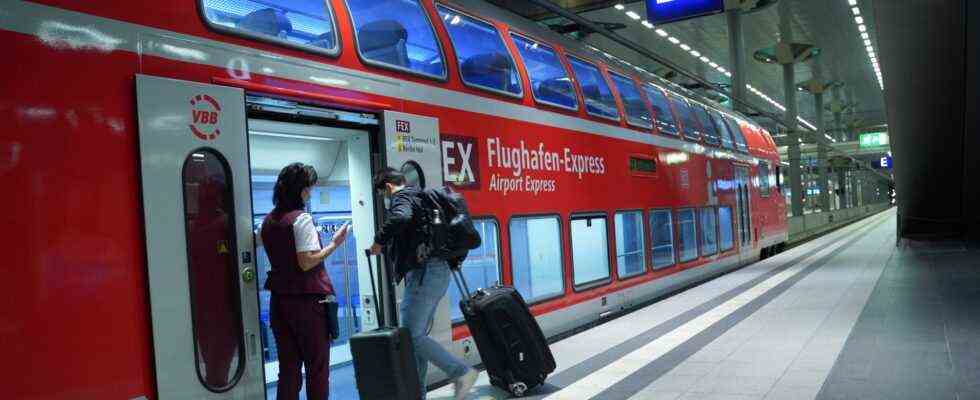Status: 07.09.2021 5:47 a.m.
After more than five days, the German Train Drivers’ Union ended its night of work – but is already threatening new strikes. The railway announced the return to the regular timetable, but did not rule out irregularities.
According to information from Deutsche Bahn, train traffic started “largely normally” in the morning after the end of the GDL strike. According to a spokeswoman, Deutsche Bahn is “very confident” that the 860 long-distance trains planned for the day as well as 21,000 regional and S-Bahn trains will run as planned again. “Irregularities can still occur in individual cases,” warned the state-owned company.
However, because delays can continue, travelers are requested to find out about the connection they have booked in advance on the Internet or via the DB Navigator app. Further information can also be obtained via the hotline 08000-996633 throughout Tuesday.
Far-reaching restrictions
Both sides want to draw a conclusion from the strike round in the course of Tuesday. One thing is already clear: the third and so far longest strike round in the ongoing collective bargaining dispute at the railways has led to far-reaching restrictions in freight and passenger transport and has hit train travelers and industrial customers hard.
However, the union has already shown that it can go even longer: 127 hours in passenger traffic and 138 strike hours in goods traffic lasted the longest round of industrial action by the GDL in a collective bargaining dispute. That was in May 2015. It was not until two months later that a collective agreement was concluded in an arbitration process.
Second longest strike in railway history
The strike that has now ended, however, lasted 110 hours in passenger and 118 hours in freight. This makes it the second longest in the history of Deutsche Bahn AG. However, a rapprochement between the two sides is not in sight. “After the strike is before the strike,” said the chairman of the GDL train drivers’ union, Claus Weselsky, in front of members at Berlin Central Station on Monday afternoon. It is up to the management of the railway whether there will be another labor dispute.
In addition to classic tariff issues then and now there is a dispute about the law on collective bargaining and the GDL’s sphere of influence in the group. The law came into force in 2015. It stipulates that in a company with several unions only the collective agreement of the employee representative body with a larger number of members will be applied. In most of the approximately 300 rail operations, from the Group’s point of view, this is the rail and transport union competing with the GDL.
GDL boss Claus Weselsky is therefore forced to expand his sphere of influence to other trades and to become the majority union. In addition to the train staff, he therefore also wants to negotiate for workshop employees as well as for employees in the infrastructure and administration – areas that have traditionally been represented by the EVG so far.
Weselsky calls for a new offer
Shortly before the end of the strike, Weselsky reiterated his demand for an offer that would enable the union to conclude a collective agreement for all members in the various rail companies. In addition to these questions, the wage dispute is also about money. The GDL is calling for a total of 3.2 percent higher wages and salaries for a term of 28 months and a corona bonus of 600 euros. The railway had recently offered a term of 36 months and agreed to the corona premium. There is also a dispute about the future form of old-age provision.
With a view to the citizens and passengers affected by the strike, Weselsky said: “We ask you to accept and appreciate that employees here show in an exemplary manner how to bring an employer to its knees in a labor dispute who uses taxpayers’ money to waste and self-interest . “
Progress uncertain
How the collective bargaining will continue is uncertain. The positions are still far apart, the railway apparently does not want to present a new offer for the time being. On Wednesday, shortly before the start of the strike, the group tried to prevent the labor dispute with a new offer. After the GDL refused, the railway tried to prohibit the recusal as disproportionate before the labor court in Frankfurt. With that she failed.
Bahn: Hardly anyone except train drivers is on strike
In addition to the train staff, the GDL had also called on employees from other employment groups to go on strike – according to statements by the railway, however, only a few of these employees took part in the labor dispute. In the areas of network, maintenance and at the train stations “no work stoppages worth mentioning have been recorded,” explained Deutsche Bahn.
According to this, almost 7,500 train drivers have so far participated in the third wave of strikes, and Deutsche Bahn employs around 19,700 in total. Of the around 48,000 DB Netz employees, a total of 62 signalmen had gone on strike last week since the strike began last week, and 40 of over 24,000 employees in maintenance were on strike. According to Bahn 22, of around 7200 employees in the passenger stations went to work.

